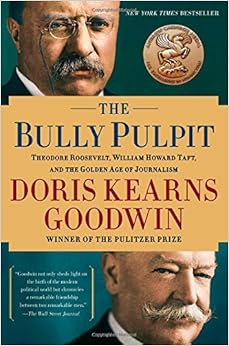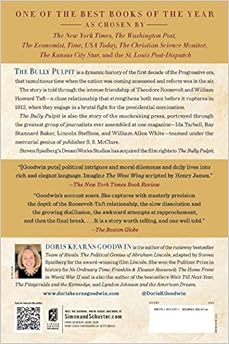Amazon.com Review
An Amazon Best Book of the Month, November 2013: In an era when cooperation between the national media and the US government seems laughable, Pulitzer Prize-winning historian Doris Kearns Goodwin’s timely 100-year look backward explores the origins of the type of muckraking journalism that helped make America a better country. Focusing on the presidencies of Theodore Roosevelt and his successor, William Howard Taft
--one-time colleagues and friends who later became sworn foes--Goodwin chronicles the birth of an activist press, which occurred when five of the nation’s best-ever journalists converged at McClure’s magazine and helped usher in the Progressive era. At times slow and overly meticulous, with a lot of backstory and historical minutiae, this is nonetheless a lush, lively, and surprisingly urgent story--a series of entwined stories, actually, with headstrong and irascible characters who had me pining for journalism’s earlier days. It’s a big book that cries out for a weekend in a cabin, a book to get fully lost in, to hole up with and ignore the modern world, to experience the days when newsmen and women were our heroes. --
Neal Thompson
--This text refers to an out of print or unavailable edition of this title.
*Starred Review* In this hyperpartisan era, it is well to remember that a belief in an activist federal government that promoted both social and economic progress crossed party lines, as it did during the Progressive movement of the early twentieth century. Goodwin, the acclaimed historian, repeatedly emphasizes that fact in her massive and masterful study of the friendship, and then the enmity, of two presidents who played major roles in that movement. Roosevelt, unsurprisingly, is portrayed by Goodwin as egotistical, bombastic, and determined to take on powerful special interests. He saw his secretary of war, Taft, as a friend and disciple. When Taft, as president, seemed to abandon the path of reform, Roosevelt saw it as both a political and a personal betrayal. Taft, sadly remembered by many as our fattest president, receives nuanced, sympathetic, but not particularly favorable treatment here. But this is also an examination of some of the great journalists who exposed societal ills and promoted the reforms that aimed to address them. Many of these muckrakers, including Ida Tarbell and Lincoln Steffens, worked for McClure’s magazine. This is a superb re-creation of a period when many politicians, journalists, and citizens of differing political affiliations viewed government as a force for public good. HIGH-DEMAND BACKSTORY: This author’s new book has been greatly anticipated; much prepublication discussion has occurred; and reader interest will be intense. --Jay Freeman
--This text refers to an out of print or unavailable edition of this title.







